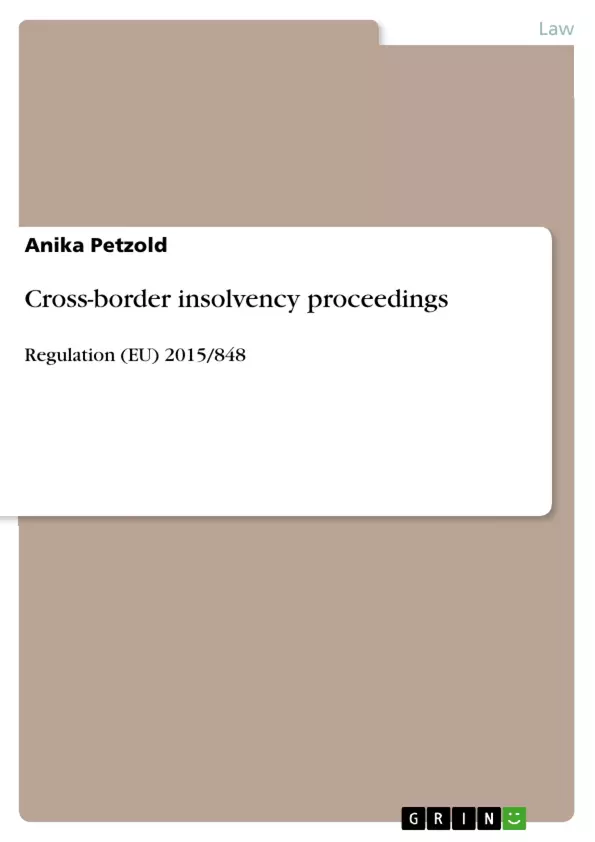The following explanations include the objectives as well as the scope and special features of the Regulation (EU) 2015/848 of the European Parliament and of the Council of 20 May 2015 on insolvency proceedings (EuInsVO/EIR) which are illustrated by means of a practical example.
The aim, to avoid bogus companies in order to move assets in other countries at the expense of creditors or to affect the International jurisdiction by relocation of registered office could thus be implemented within the EU. This was most recently confirmed by the case law (ECJ, Judgement from 24.03.2023 – C-723/20).
Inhaltsverzeichnis (Table of Contents)
- Introduction
- Objectives of the regulation ...
- Insolvency law cross-border issues
- Outside the EU (Matters relating to foreign countries (Third Countries)...
- Inside the EU (Matters relating to foreign countries (EU-countries)
- Scope of application of the EIR (Reg. 2015/848)..
- Material scope......
- Temporal scope
- Spatial-personal scope……………….
- Example and problem statement.
- Determination of COMI – practice example.
- Ascertainment of the COMI......
- Jurisdiction .........
- Eurofood / Parmalat..
- BRAC..
- COMI of Siemens AG . _
- Conclusion.......
Zielsetzung und Themenschwerpunkte (Objectives and Key Themes)
This paper aims to provide an overview of the Regulation (EU) 2015/848 on insolvency proceedings, also known as the EIR, focusing on its scope of application and the determination of the center of main interests (COMI). The paper aims to analyze relevant legal aspects and provide practical insights through examples and case studies.
- Cross-border insolvency issues within and outside the EU
- Scope of application of the EIR (Reg. 2015/848)
- Determination of COMI as a key factor for jurisdiction in insolvency proceedings
- Practical application of COMI determination through case studies
- Analysis of relevant legal principles and case law
Zusammenfassung der Kapitel (Chapter Summaries)
- Introduction: This chapter provides a brief introduction to the topic of cross-border insolvency law and the significance of the EIR (Reg. 2015/848) in regulating such matters.
- Objectives of the regulation ...: This chapter discusses the objectives and goals of the EIR, highlighting its intended role in streamlining cross-border insolvency proceedings within the EU.
- Insolvency law cross-border issues: This chapter explores the complex nature of cross-border insolvency issues, examining the legal challenges arising from cases involving entities operating across national borders, specifically focusing on the differences between issues involving EU and non-EU countries.
- Scope of application of the EIR (Reg. 2015/848)..: This chapter delves into the different aspects of the EIR's scope of application, including its material, temporal, and spatial-personal scope, providing a comprehensive overview of the regulation's reach.
- Example and problem statement.: This chapter illustrates the practical application of the EIR's principles through an example and problem statement, highlighting key considerations and challenges in determining COMI.
- Determination of COMI – practice example.: This chapter focuses on the specific aspects of determining COMI, providing a practical example of the process and the relevant factors involved.
- Ascertainment of the COMI......: This chapter examines the legal framework and methodologies used to ascertain the COMI of a debtor, providing insights into the criteria and processes involved in making this determination.
- Jurisdiction .........: This chapter delves into the crucial aspect of jurisdiction in cross-border insolvency proceedings, discussing the role of COMI in determining the competent court and the legal framework for establishing jurisdiction.
Schlüsselwörter (Keywords)
The key focus of this paper is on the Regulation (EU) 2015/848 on insolvency proceedings, specifically its application to cross-border insolvency issues. The analysis centers around the determination of the center of main interests (COMI), its significance for jurisdiction in insolvency cases, and the practical implications of these concepts within both EU and non-EU countries. Case studies like Eurofood/Parmalat and BRAC are used to illustrate key legal concepts and the practical application of the EIR's provisions.
- Arbeit zitieren
- Anika Petzold (Autor:in), 2023, Cross-border insolvency proceedings, München, GRIN Verlag, https://www.hausarbeiten.de/document/1496338


